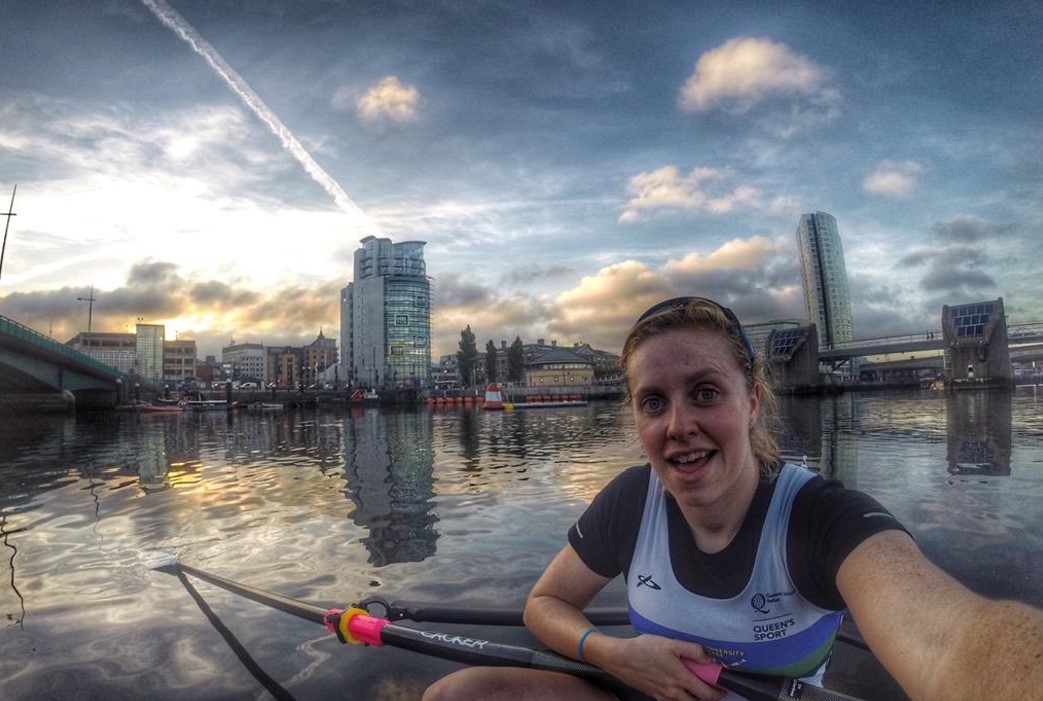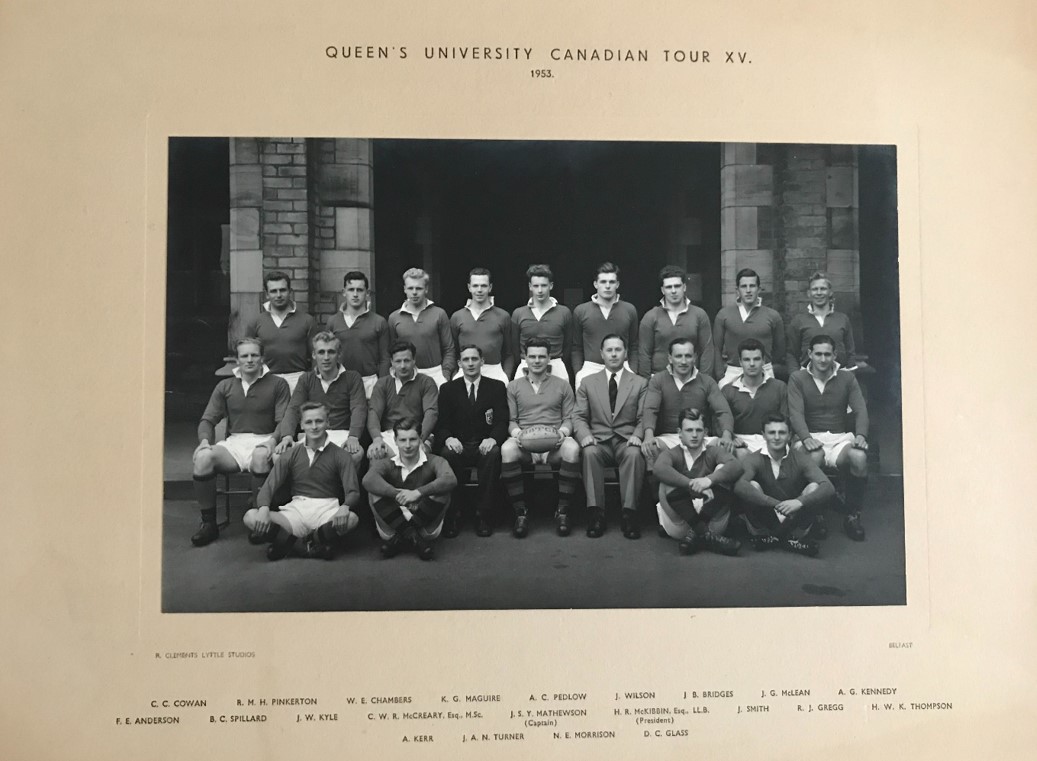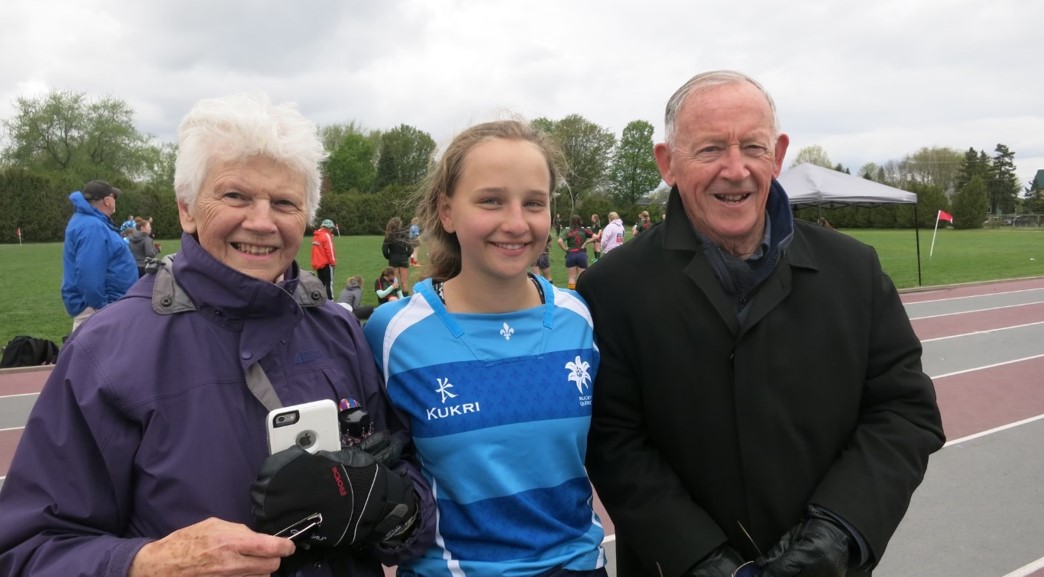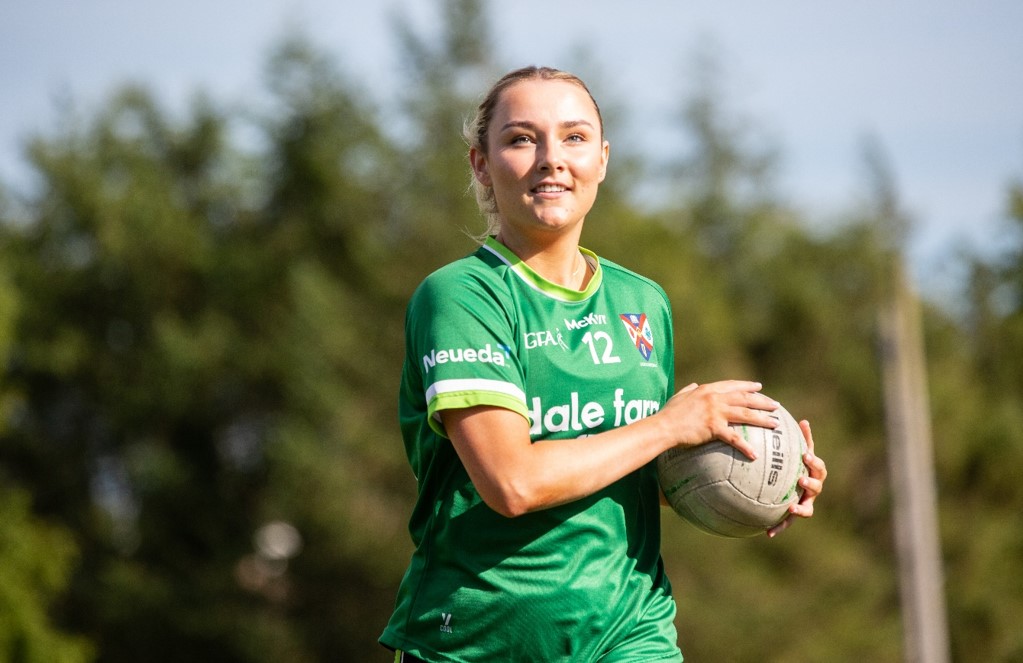From elite rowing and the Canada Rugby Tour of 1953 to encouraging more girls to take up GAA sports: at Queen’s, we like to win. But we love to play.

Back in 2012, Rebecca Edwards was just a new student wandering around the freshers’ fair when she came upon the Boat Club stall. She’d never done any rowing before, but she loved sport and it sounded like fun. So, she signed up. Just nine years – and a huge amount of hard work – later, she joined Team GB women’s eight at the Tokyo Olympics.
“The decision I made to join the Boat Club is the best I ever made,” Rebecca says. “And I’m so grateful that I was put on the Athlete Pathway.” The Queen’s Athlete Pathway caters for beginners right the way through to elite athletes: students have gone on to European, World and Olympic competitions. Students representing Queen’s competitively are given coaching by Queen’s Sport. Those with the potential to go further are offered more support, the flexibility to train around their studies, and scholarships of up to £1,500. The highest level – elite – gives athletes a package of benefits including one-to-one support, flexibility and scholarships of up to £5,000.
The rowing programme’s three levels echo the Pathway. “At the first level, our beginners learn to row,” explains head coach John Armstrong, who is also a high-performance coach for Rowing Ireland. “Our next level rowers take part in intermediate level competitions, and we then have our elite athletes. Our goal is to get as many beginners as possible to have a good first year – and ideally to win a beginner or intermediate level race. Last year, we were the most successful university beginner programme.”
After a few months of rowing, Andy Wells, Boat Club coach and Allstate NI Queen's Alumni Volunteer of the Year 2021, told Rebecca that she had the potential to go further – and asked her to consider giving up her other sport, hockey, for more rowing. She had always wanted to be an elite athlete. “I was good enough at sport, but I didn’t excel at any of them. When rowing gave me the opportunity to be the best, it was too good an opportunity to miss.”
Gradually, her training increased until she was doing it every day. And it soon started to pay off. In 2013, she won the Irish National Championship as a Novice. That same year, she was part of the crew that took the British University Championships 2013 Silver medal in both the beginner coxed four and eight. By 2015, she was on the Pathway as an elite athlete.
“Being on the Pathway was helpful in so many ways, because I didn’t know what help I needed to succeed – I thought I’d just get in the boat and try my hardest,” says Rebecca. “But on the Pathway, I had access to physiotherapy, which is incredibly important for rowers. I had expert guidance around nutrition, mindset and organisation. I had fantastic support from everyone at Queen’s Rowing.”
Queen’s has invested in rowing as a priority sport, and Rebecca isn’t the only one to find success through the Pathway. This summer saw success for other rowers who benefited from the support programme, including: Hugh Moore and Ciaran Purdy, who won a Silver medal for Ireland in the European U23, and Bronze with James Foley at the EUSA; and Molly Curry who came fifth for Great Britain at the European U23. Five rowers currently on the Pathway also achieved strong performances at the Senior World Championships in the Czech Republic this year – and have Olympic qualification in their sights. “Before Covid, we were the 35th-ranked university out of 80 in the British Universities and Colleges Sport (BUCS). In 2021 we were 17th, and last year we were third,” says Armstrong. “That’s an amazing achievement for us, and success also has a knock-on effect on our participation. If you’re successful, people want to be part of it.”
And Rebecca – who won silver at the European Championships this summer – has now set her sights on the 2024 Paris Olympics. “In Tokyo, I was nervous but still able to get the best out of myself in the most high-pressure environment. Going to the Olympics was my lifelong dream. But now I’ve achieved it, I don’t think I’ve reached my limit. I feel I have so much more to give.” Rowing, she says, opened doors to her that she never even knew existed. “I’ve been to so many other countries, made so many friends and spoken at many events. It’s incredible how far hard work and the right support can get you.”

In 1953, Queen’s Rugby Club embarked on their first ever tour of North America – thanks, in part, to a rather unlikely intervention. As Ciaran Donaghy relates in his book The Pride of Queen’s, Field Marshal Montgomery was in Canada when the subject of the tour came up. Should Oxford play? Montgomery pointed out that Queen’s beat Oxford every year – and the decision was made in Queen’s favour.
No wonder: the Queen’s team included eight Irish internationals – Robin Gregg, Noel Henderson, Jack Kyle, John Smith, Fuzzy Anderson, Robin Thompson, Adrian Kennedy and Cecil Pedlow, who would go on to represent Ireland 30 times.
And it proved to be a truly life-changing event for one team member in particular – Dr Ronald Pinkerton. A dedicated rugby player since his schooldays, he was working an overnight hospital shift when he got the call that he’d been selected for the 1953 tour.
“That was an important night in his life,” says his son, Andrew Pinkerton. “It was a big contrast for him being in North America just eight years after the end of the Second World War – he had experienced rationing and had been affected by some of the bombing of Belfast in 1941. North America wasn’t impacted like that at all! One of the reasons he came to Canada to live was the tour. The enthusiasm and optimism of the Canadian hosts had a very positive impression on him. There weren’t a lot of physicians being trained in Canada at the time, so he was encouraged to come back.”
The tour visited Vancouver and British Columbia before travelling on to California, where they visited Paramount Studios, met the comedian Jerry Lewis and played at the Rose Bowl in Los Angeles, which holds around 100,000 people and is still the 16th largest stadium in the world today. “My father often talked about playing in this massive stadium against the UCLA team, which had a lot of American football players. In 1954, it was voted the best college football team in the US,” says Andrew. “A huge stadium with huge players – but Queen’s still won!”
Ronald and his wife Marjorie met when they were both studying Medicine at Queen’s: Marjorie herself is a double Blue (tennis and hockey) and a talented sportswoman. In 1956, after graduation, they left Northern Ireland for further medical training in Montreal. Ronald’s love of rugby continued, despite the punishing schedule of a busy doctor – he became an eminent ophthalmologist at Queen’s University, Kingston, Ontario, where the RMH Pinkerton Lecture in Ophthalmology was established in his honour. Marjorie also practiced medicine at Queen’s University, Kingston, specialising in paediatric cardiology, and was very involved in the paediatric residency program.
In 1957, he was selected to play for the Province of Quebec against the Barbarians – a team that included notable players such as Irish international, British and Irish Lion and Queen’s Honorary Graduate Tony O’Reilly, Welsh international and Lion, Cliff Morgan and English captain Eric Evans. Quebec lost but Pinkerton shone. The Montreal Star wrote: “The Quebec forwards gave their finest display in many seasons as they often gained possession from the scrums, with hooker Ronnie Pinkerton playing a great game.”
The couple had five sons, and Andrew, the youngest, carried on the family rugby tradition, as do two of their grandchildren – Nicholas played for McGill University in Montreal and Elena is the hooker, like her grandfather, for the current Canadian national champions, Queen’s University.
Ronald sadly died in June 2021. But in 2022, Andrew got the chance to watch a new Queen’s team and share his father’s story with a new generation of players, as Queen’s Rugby Club toured Canada once again. “When I heard about it, I emailed to let Queen’s know that I had some of my father’s photos, and they were very interested to see them,” he says. “It was great to make that connection, and I am happy for Queen’s to now have more history of that tour. My father had such positive memories of it – particularly the camaraderie of his teammates and the warmth of the North American hosts.”

Caption: Elena Pinkerton, Ronnie Pinkerton and Marjorie Pinkerton nee Boyle - Elena representing Quebec U16

Not everyone gets the chance to experience all the benefits that sport can bring. Across higher education, only 48.6 per cent of female students take part in physical activity once a week compared to 64.7 per cent of their male counterparts (according to British Universities and Colleges Sport). That’s why increasing female participation in sport is a key goal for Queen’s – and clubs are finding innovative ways of doing it.
From running for fun to rowing at an elite level, the benefits of sport are huge – particularly at university. Along with boosting physical and mental wellbeing, it’s a fantastic way to meet new people and develop new transferable skills, especially when you’re helping to manage a club or organise an event.
The six sports that come under the Gaelic Athletic Association (GAA) umbrella – hurling, Gaelic football, handball, rounders, camogie and ladies football – are all played at Queen’s. After students returned to university post pandemic, the GAA agreed that they needed to encourage more women to discover the many benefits of sport.
“We looked at the opportunities we could offer, and we thought: how can we make these more attainable? How can we make it easier for women to access GAA sports at Queen’s?” says GAA Development Officer Gavan Duffy. “And how can we increase opportunities not just to take part, but to advance women in the GAA?”
The result is the GAA Female Participation Programme, which operates on several levels. Along with taster sessions and opportunities to join teams, it’s also bringing in female coaches and offering players the chance to gain their own coaching qualification, creating a virtuous circle where players can give back and encourage more women into the sport in turn. Students run their own teams, enabling them to gain financial, leadership and communication skills.
“We’re very much a community organisation,” says Gavan. “Everything we do revolves around putting something back into your community. In fact, 90 per cent of the people involved in GAA are volunteers. We have a lot of alumni who come back and get involved. They’ve really enjoyed their time here and they want to give back.”
But they needed funds to run the programme, and decided to give crowdfunding a go. Their original goal was £10,000 – at the time of writing, the total raised stands at an incredible £48,060. “It’s taken on a life of its own!” says Gavan. “We worked hard to promote it and make a good case. We also have a great presence on social media. And our supporters all over the world have responded.”
Crowdfunding has also hugely benefited Queen’s Hockey, which has five women’s teams and two men’s teams. Again, they were keen to reinvigorate the sport following Covid, with a particular emphasis on encouraging young women. Chloe McIlwaine is Hockey Development Officer at Queen’s. “We’ve got people coming in at lots of different standards,” she says. “Some of them have represented their countries, and some haven’t picked up a stick since school but just want to get involved in something fun and social. We noticed a growth in numbers once we were allowed to play in bubbles during Covid – people really wanted that real-life contact.”
They wanted to keep that going and give all students the opportunity to feel like they were part of something. So, they worked out a new programme. A mixed league was a big success, with more than 90 players participating, and they decided to offer six-week blocks of training to give beginners a taste of what hockey is really like. But again, they needed more funding.
Like GAA, they set up a crowdfunder, and received match-funding from the National Emergencies Trust to match their fundraising efforts pound for pound. And just like GAA, it’s been a huge success. The fund currently stands at £26,380 and will help to pay for everything from new equipment to coaching to travel costs.
“It’s been fantastic to see women’s sport having a moment, such as England winning the Euros and the high profile of the Women’s Rugby World Cup in New Zealand,” says Chloe. “It’s given people role models, and now women’s sport is becoming so much more visible. I feel so passionate about getting students involved at any level.”
Top of Page